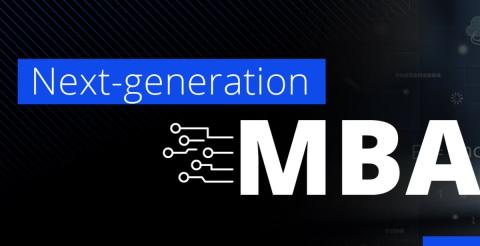How to become a business analyst in Australia


Data matters to organisations. Recent Deloitte modelling indicates that even a one-point increase in a company’s data maturity score leads to a 9.5 per cent revenue growth each year.
This roughly equates to an additional A$38 million for major organisations in Australia.
The challenge for organisations is how to effectively use data to make a difference. After all, data is only helpful if you can understand it. Within an organisation, the people who understand data best are typically data analysts, research analysts and, importantly, business analysts.
Becoming a business analyst in Australia enables you to make a real impact in the organisation you work for. Your responsibilities can range from collaborating with finance, marketing and information technology (IT) professionals to presenting actionable insights and strategies to C-suite executives.
Whatever you’re doing, your role as a business analyst will be vital to organisational success.
So, if solving complex problems and tackling unique challenges drives you, becoming a business analyst might be the ideal career choice. Interested?
Here’s our advice on exactly how to become a business analyst in Australia.
What skills do you need to be a business analyst?
The field of business analytics is the crucial link between data and how to use it effectively, and studying business analytics is important to establishing this link. Your job as a business analyst is to harness the power of data by interpreting it.
That means turning it into actionable information that your organisation can use to solve problems and inform decision-making.
Contrary to common myths and misconceptions, a successful career in business analytics involves much more than just number crunching. To do the job well, you’ll need a blend of technical and emotional intelligence skills.
Technical skills
Just some of the technical skills you’ll need as a business analyst include understanding and being able to use:
- Statistical analysis and database software
- Database querying languages
- Programming skills in languages such as Python and R
- Survey/query software
- Business intelligence and reporting software
- Data mining, data visualisation and database design skills
- Accounting knowledge
- Financial management skills
Emotional intelligence skills
Understanding and interpreting data is only half of your role as a business analyst. The other half involves sharing the insights you uncover in a way that enables your organisation to use them. This requires strong:
- Communication and storytelling skills
- Problem-solving and critical thinking skills
- Organisational skills
- Attention to detail
- Collaboration skills

What does a business analyst do?
A business analyst plays a critical role in an organisation’s success by identifying and solving challenges in its business operations. Their work is dynamic and varied, ensuring that no two days are the same.
As a business analyst, you are the bridge between the business’s needs and the technical solutions, which means your work is integral to driving positive change.
Here’s what a business analyst typically does:
- Identifying business needs. Analysts uncover an organisation’s needs by analysing processes, systems and structures to identify areas that need improvement.
- Stakeholder collaboration. They work closely with various stakeholders, including managers, team leaders and IT professionals, to gather requirements and ensure everyone is on the same page.
- Problem-solving. With a clear understanding of the challenges, business analysts develop solutions. This might involve improving processes, implementing new software or restructuring certain aspects of the business.
- Data analysis. They analyse data to inform decision-making, ensuring that their recommendations are backed by solid evidence. This helps in accurately forecasting the outcomes of any proposed changes.
- Documenting and reporting. Once a solution is identified, business analysts document the requirements and processes in detail, providing a clear guide for implementation.
- Support implementation. After recommendations are accepted, they often help guide the implementation process, ensuring that the changes are rolled out smoothly and effectively.
- Testing and validation. They might also be involved in testing new systems or processes to validate that they meet the identified requirements.
- Feedback loop. After implementation, they gather feedback to assess the impact of the changes and make any necessary adjustments.
Ultimately, being a business analyst means working at the heart of problem-solving within an organisation.
These analysts collaborate with various teams to understand their challenges, develop solutions and see their recommendations come to life, making a tangible difference in how the business operates.
What’s it like to be a business analyst?
If you’re wondering how to become a business analyst, you’re likely interested in what working as a business analyst is like. One person who can answer this question is Turker Celik, a senior business analyst at the NSW Department of Customer Service.
According to Celik, collaboration is one of the most important aspects of his daily work.
“I would say that half my day, or even half my week is about collaboration,” Celik says. “So for me, that is working with business stakeholders, engineers, UX designers, testers and customers.”
Celik says that for the remainder of his working day, he is working independently on tasks such as:
- Preparing to facilitate upcoming meetings
- Creating guidance documents for the project team
- Documenting workshop findings
- Documenting the analysis the team does to create artefacts for input into technical solution designs
- Planning project timelines and resourcing
- Assisting the development team when unexpected issues arise
- Answering queries from business stakeholders on product strategy
How to become a business analyst in Australia
Business analysts and other data professionals are in high demand. According to a recent report from SnapLogic on the state of data and analytics in Australia and New Zealand, there is a continued high demand for data and analytics expertise, with 86 per cent of survey respondents saying they’d noticed a marked increase.
The increased demand for data professionals is partly due to accelerated workplace digitalisation in response to the pandemic. More digital technology means more data collection and employers are now looking for data analytics talent to help them make sense of the data they’re collecting.
To take advantage of this growing need for data professionals, follow these four steps to become a qualified business analyst.
1. Obtain a high-quality, relevant tertiary qualification. Most business analysts hold a minimum of an undergraduate degree in a relevant field such as:
- Business
- Business administration
- Computer science
- Information technology
- Finance
- Project management
- Accounting
- Engineering
- Information science/statistics
- Economics
- Psychology
- Marketing
However, some employers are looking for candidates with a business analyst education that includes a relevant master’s degree. This means that studying for an Online MBA qualification is an excellent choice if you want to:
- Develop more specialist analytics skills in your current role
- Advance or broaden your career opportunities
- Gain a competitive edge by developing expert technical analytics capabilities
A graduate degree can also improve your full-time employment prospects and boost both your confidence and competence.
Celik says that doing a master’s degree helped him strengthen his communication skills while building his technical analytical skills.
“My master’s degree helped me a lot in people management, especially with peer management. As a business analyst, you work with many different people across an organisation, and you need to be able to collaborate and communicate clearly with everyone,” he says.
2. Become a member of the Australian Chapter of the International Institute of Business Analysis (IIBA). Successful business analysts continue to develop the professional networks they built while studying by joining the global association for business analysts.
3. Understand the BABOK® Guide. A Guide to the Business Analysis Body of Knowledge® (BABOK® Guide) from IIBA is a globally recognised reference guide to the standards of practice for business analysis professionals. Membership in the IIBA includes access to helpful resources such as a self-assessment tool to measure your competency and event information, and you’ll be part of a community of like-minded peers.
4. Gain work experience. People with no prior work experience in a relevant field often start their business analyst career in an entry-level data professional role. Then, once they have enough on-the-job experience, they tend to advance into a business analyst position.
For example, you might begin as a data or financial analyst and then move into a business analyst role.

What to expect from a Master of Business Administration (MBA) at UTS?
At UTS Online, we’ve designed our Master of Business Administration (MBA) course to develop confident, agile leaders who can navigate change and drive impact across industries. The course blends core business foundations with the flexibility to specialise in areas like Business Analytics — ideal for those looking to strengthen their ability to interpret data and guide strategic decisions.
Core Curriculum
The MBA program comprises 12 subjects, including eight core subjects that provide a solid foundation in essential business disciplines:
- Leading People and Change
- Marketing in the Age of Technology
- Accounting for Decision Makers
- Managerial Economics
- Data-Driven Decision-Making
- Financial Fundamentals
- Governance and Sustainability
- Strategy and Negotiation
These subjects are designed to enhance your strategic thinking, leadership capabilities and understanding of contemporary business practices.
- Leading People and Change
- Marketing in the Age of Technology
- Accounting for Decision Makers
- Managerial Economics
- Data-Driven Decision-Making
- Financial Fundamentals
- Governance and Sustainability
- Strategy and Negotiation
These subjects are designed to enhance your strategic thinking, leadership capabilities and understanding of contemporary business practices.
Specialisations and Electives
Beyond the core subjects, you have the opportunity to tailor your MBA through four elective subjects. You can choose to specialise in areas such as:
- Business Analytics
- Digital Marketing
- Health
- Organisational Learning
- Technology Management
Alternatively, the 'Flex' stream allows you to mix and match electives across different specialisations, aligning your studies with your unique career goals.
Practical Application and Industry Relevance
The UTS Online MBA emphasises real-world application of knowledge. Through case studies, projects and interactive learning, you'll apply theoretical concepts to practical business challenges, preparing you to make informed decisions and lead effectively in your organisation.
Support and Networking
As an online student, you'll have access to a range of support services, including academic assistance and career guidance. The program also fosters connections with peers, tutors and industry professionals, enabling you to build a valuable professional network.

Broaden your career horizons with UTS Online
Become a business analyst in Australia and advance your career in a world harnessing the power of data by studying a Master of Business Administration at UTS Online.
The course is 100% online with no on-campus commitments. That means you’ll have the flexibility to study whenever and wherever works best for you.
At the same time, you’ll always have the support of a dedicated Student Support Advisor throughout your study journey.





